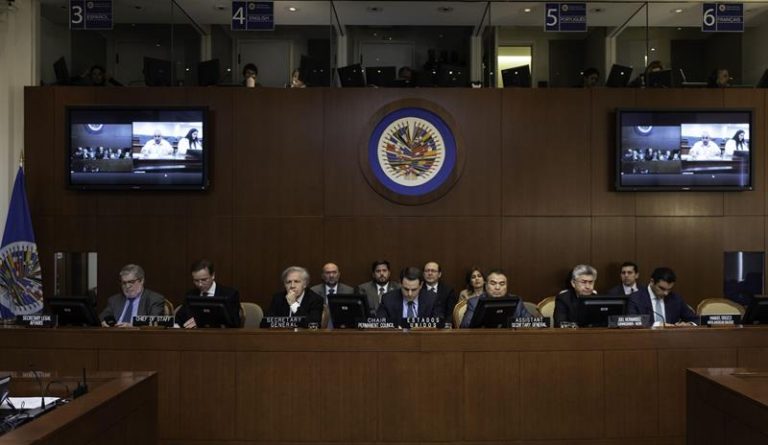7 de abril 2019

Children of Exile: The Births “Sowing Hope” in the Camp of Nicaraguan Farmers

PUBLICIDAD 1M
PUBLICIDAD 4D
PUBLICIDAD 5D
Luis Angel Rosadilla, witness in the negotiation, reported that progress on calling early elections have not advanced “one millimeter"

Luis Angel Rosadilla
The political credibility of Daniel Ortega continues to decline with several countries in the Organization of American States (OAS) warning Friday of a delaying tactic of the regime in its talks with the Civic Alliance. The nations also demanded, as a gesture of good will, the return to Nicaragua of international organizations for the defense of human rights, such as the Inter-American Commission on Human Rights (IACHR).
The Permanent Council of the OAS took up the issue of Nicaragua in a special session and heard the report of several experts and officials of the organization, among them Luis Angel Rosadilla, delegate of the OAS Secretary General, Luis Almagro, and witness of the negotiations, who highlighted that “not even a millimeter” of progress has been made in the areas of early elections, or reparation and justice for the victims of Ortega’s repression.
In diplomatic language, Rosadilla stressed that on the issue of strengthening democracy and electoral reforms “the debate had entered into a stage of reflection,” while the aspect of “truth, justice, reparation and non-repetition has been discussed on several days and there has been no agreement.”
Rosadilla, who first served as a guest and is now a witness and companion of the negotiations, assured that in all the dialogue sessions “the climate has been frank, sometimes strong, but the discussion centered on the issues and the facts.”
The delegate of the OAS General Secretariat commented that he hopes that the negotiations on the pending points “can be resumed in the short term.” However, the Civic Alliance sent a letter to the OAS countries, in which it affirms that “the significant differences on these two issues and the refusal by the government to seek a rapprochement of positions led us to the conviction that there was a lack of will to build consensus on these issues of great relevance to solve the deep sociopolitical crisis facing Nicaragua.”
They add that “these events have led the Civic Alliance to take the decision to suspend the discussion of agenda items concerning justice and democracy until there are serious signs of political will that translate into concrete facts for the search for a prompt peaceful solution demanded by citizens.”
The Ambassador of Paraguay to the OAS, Elisa Ruiz Día, said the Ortega regime executes the same “delaying tactics” of the Maduro government in Venezuela. She urged a real commitment from the regime to the implementation of electoral reforms.
In the same vein, Hernan Salinas, the Chilean representative at the OAS, said that there is a “lack of real will” of the regime and that the only thing it seeks is “to gain time,” to maintain the repression and not comply with the agreements it signs.
The fulfillment of these agreements should, according to the majority of the OAS Ambassadors, be supervised by international organizations such as the Inter-American Commission on Human Rights (IACHR), expelled by the Ortega regime.”
The Costa Rican Ambassador to the OAS, Monserrat Solano Carboni, noted that only international organizations such as the IACHR and the Special Follow-up Mechanism for Nicaragua (MESENI) can give guarantees to the negotiations between the regime and the opposition.
The Costa Rican diplomat described as “cynical” the claim of the government, to impose its National Police, as one of the organizations to investigate the crimes committed by its own agents and Ortega’s paramilitaries [that operated with them]. That position is shared by the April’s Mothers Association, whose members declared that the repressive regime is incapable to establish the truth and impart justice. They demand the presence in Nicaragua of the IACHR.
Archivado como:
PUBLICIDAD 3M
Confidencial es un diario digital nicaragüense, de formato multimedia, fundado por Carlos F. Chamorro en junio de 1996.
PUBLICIDAD 3D